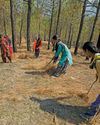
INDIA HAS constructed over 100 million household toilets under its Swachh Bharat Mission in recent years. While this has improved the country’s overall sanitation levels, it has thrown open the challenge of handling vast amounts of faecal sludge, the mixture of human excreta and water. One of the solutions lies in separating the solid and liquid components and treating them separately. The liquid can be decontaminated and used for irrigation and toilet flushing. The solid can be composted and pasteurised to make biosolids and used as organic fertiliser.
To understand the potential of faecal sludge as a fertiliser, we recently conducted a field trial in Alair, Telangana. Our experiment, conducted on okra cultivation, shows that the use of biosolids sourced from faecal sludge as organic fertiliser positively influences germination rates and enhances the growth and yield of plants. Biosolid generally contains high concentrations of macro and micronutrients essential for plant growth.
THE SETUP
The trial was conducted by growing okra on two soil beds, one with only red soil that is commonly used for farming in southern India (control bed) and the other with premixed biosolids and red soil in a 1:1 ratio (experimental bed).
Denne historien er fra January 16, 2024-utgaven av Down To Earth.
Start din 7-dagers gratis prøveperiode på Magzter GOLD for å få tilgang til tusenvis av utvalgte premiumhistorier og 9000+ magasiner og aviser.
Allerede abonnent ? Logg på
Denne historien er fra January 16, 2024-utgaven av Down To Earth.
Start din 7-dagers gratis prøveperiode på Magzter GOLD for å få tilgang til tusenvis av utvalgte premiumhistorier og 9000+ magasiner og aviser.
Allerede abonnent? Logg på

THE CIRCULARITY ARGUMENT
A circular economy can help India achieve its developmental aspirations while following the low-carbon pathway. It will also help address the challenges of waste management, pollution and overexploitation of natural resources. Industries are already innovating to reuse high-volume wastes and have shown that the transition can usher in both environmental and financial windfalls

Banking on flawed drug voluntary licences
The Medicines Patent Pool is pushing for more VLs, but its bad deal with Novartis on a cancer drug shows the pitfalls

Lasting solutions
For the first time, the UN has recognised the role of indigenous communities in tackling aridity. A repository of traditional knowledge India has the wherewithal to lead the way

IMD at 150
India's journey into modern weather forecasting took a decisive turn 150 years ago with the establishment of India Meteorological Department during the British rule. The agency has come a long way since then, shaping the way the country predicts and responds to its diverse climate challenges

Every drop counts
In drought-prone Marathwada region, 14 villages have managed to counter water shortage by budgeting the resource

Threat to survival
Hollongapar Gibbon Sanctuary in Assam faces ecological challenges as railway electrification and hydrocarbon exploration endanger its fragile biodiversity

'Migration is going to be a battlefield'
AMITAV GHOSH is one of the foremost chroniclers of our times. His literary sojourn includes writings on topics that range from languages to climate change to human lives. His latest book, Wild Fictions, brings some of his works on these issues under one title. In a conversation with RAJAT GHAI, Ghosh shares his views on the future of human movement. Excerpts:

Face of future
California wildfires confirm forest fires are intensifying in a hotter world, emitting substantial amounts of greenhouse gases and reinforcing global warming

Friends of the forest
Residents of 30 villages in Uttarakhand establish a model for public participation in saving forests from wildfires

Climate-crazy playbook
Just hours after his second (and final) term began on January 20, US President Donald Trump unleashed 46 presidential actions. Several of these are centred on the US' climate commitments, energy transition, migration and trade policies, and are likely to have negative global implications